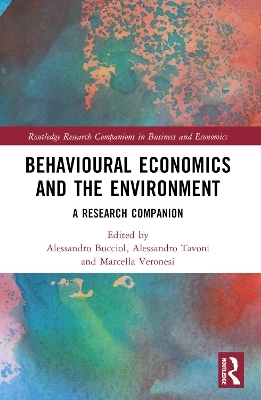
Behavioural Economics and the Environment
Routledge (Verlag)
978-1-032-00353-5 (ISBN)
This book provides a complete and rigorous overview of environmental topics that may be addressed and, in many instances, better understood by integrating a behavioural approach. This volume features state-of-the-art research on this topic by influential scholars in behavioural and environmental economics, focussing on the effects of psychological, social and cognitive factors on the decision-making process. It presents research performed using different methods and data collection mechanisms (e.g. laboratory experiments, field experiments, natural experiments, online surveys) on a variety of environmental topics (e.g. sustainability, natural resources).
This book is a comprehensive and innovative tool for researchers and students interested in the behavioural economics of the environment and in the design of policy interventions aimed at reducing the human impact on the environment.
Alessandro Bucciol is Professor of Econometrics at the University of Verona, Italy. His fields of research are household finance, behavioural economics, economic policy analysis and, in general, applied micro-econometrics. Among other topics, his research focusses on unethical behaviour, policy evaluation and pro-environmental decisions. Alessandro Tavoni is Associate Professor of Economics at the University of Bologna, Italy. His research spans several topics in environmental economics, primarily related to overcoming behavioural and political economy barriers to cooperation in the (climate) commons. This is tackled through a combination of game theory models, surveys, laboratory and field experiments in an effort to shed light on potential solutions to environmental dilemmas. Marcella Veronesi is Professor of Applied Economics at the Technical University of Denmark and Associate Professor of Economic Policy at the University of Verona, Italy. Her fields of research are applied micro-economics, environmental economics, and behavioural economics. Her research focusses on topics related to the economics of health and the environment, climate change adaptation and education, renewable energy technology adoption, food security in developing countries and the non-market valuation of public goods.
1 An introduction to the behavioural economics of the environment I Behavioral factors and environmental sustainability 2 A behavioral (economics) framework for sustainable transformation 3 Farmer heterogeneity and the greening of agriculture: The role of behavioural and financial-economic factors in explaining farming practices 4 How are social preferences of youth related to their motivations to invest in environmental conservation (local public goods)? 5 Why do fishermen comply with regulations? The role of preferences 6 Training, locus of control and sustainable land management in Upper West Ghana II Experiments on behavioural economics and the environment 7 Why do outsiders make donations to public good providers? 8 The impact of participatory interventions on pro-social behaviour in environmental and natural resource management: Evidence from the lab and the field 9 Comparative feedback and fairness in promoting cooperation: Laboratory evidence from a common-pool resource experiment 10 The choice of institutions to promote cooperation in the lab 11 The announcement effect: Early warnings of future thresholds under different framing and risk contexts III Nudges and environmental behaviour 12 On the use of behavioural instruments to affect individual waste production and disposal decisions 13 A critical assessment of the effectiveness of low-carbon nudges 14 When green nudges (don’t) work IV Unexpected shocks, environment, and behavioural consequences 15 A shock doctrine for the climate: Pro-environmental behavior following natural disasters 16 Spillover effects of natural disasters on human capital 17 Mitigating negative consequences of unexpected environmental shocks: PES programs, climate uncertainty, insurance, and inspections 18 Priming prosocial behavior and expectations in response to the Covid-19 pandemic: Evidence from an online experiment
| Erscheinungsdatum | 07.02.2023 |
|---|---|
| Reihe/Serie | Routledge Research Companions in Business and Economics |
| Zusatzinfo | 80 Tables, black and white; 22 Line drawings, black and white; 36 Halftones, black and white; 58 Illustrations, black and white |
| Verlagsort | London |
| Sprache | englisch |
| Maße | 156 x 234 mm |
| Gewicht | 771 g |
| Themenwelt | Geisteswissenschaften ► Psychologie ► Allgemeine Psychologie |
| Technik ► Umwelttechnik / Biotechnologie | |
| Wirtschaft ► Volkswirtschaftslehre ► Mikroökonomie | |
| ISBN-10 | 1-032-00353-7 / 1032003537 |
| ISBN-13 | 978-1-032-00353-5 / 9781032003535 |
| Zustand | Neuware |
| Haben Sie eine Frage zum Produkt? |
aus dem Bereich


